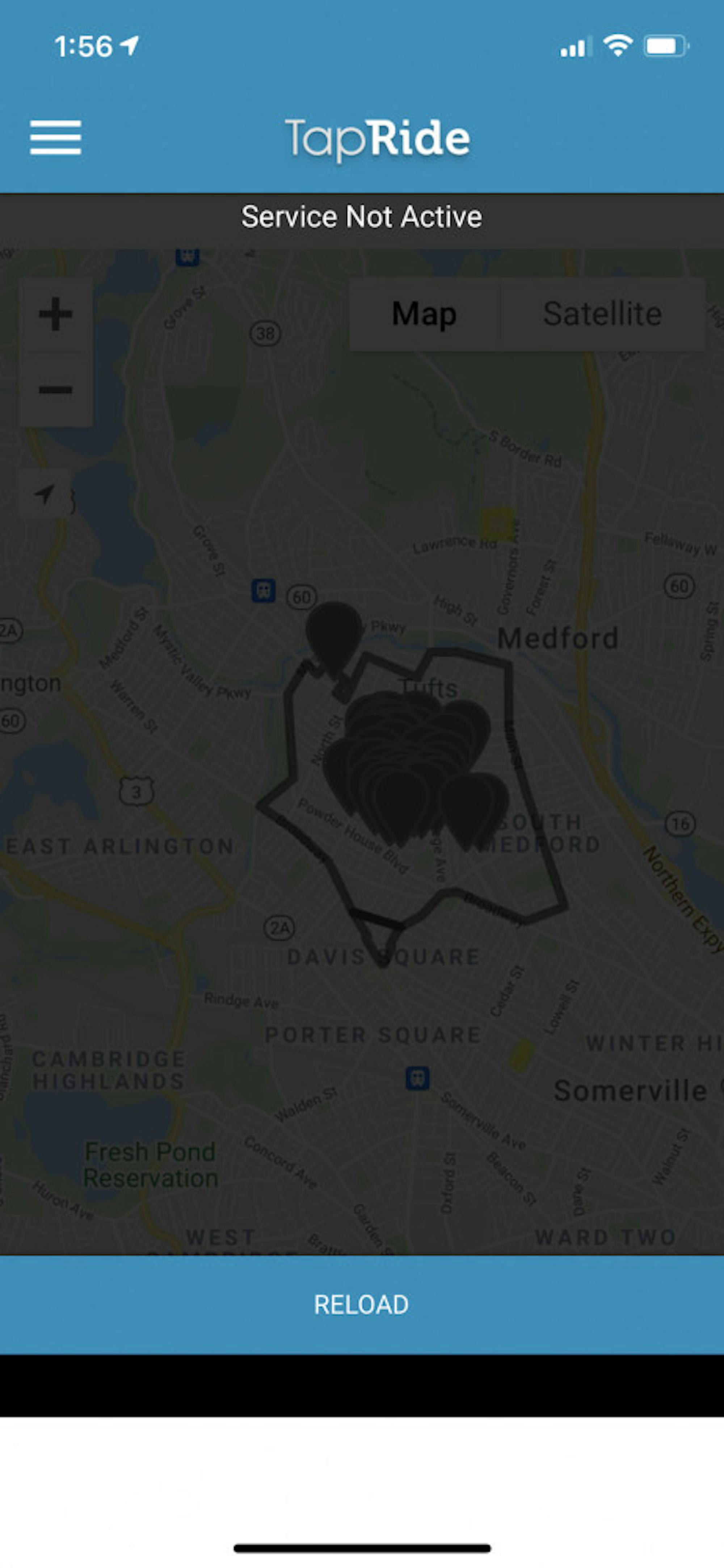SafeRide services are currently unavailable for Tufts University students due to a shortage of campus security officers. According to Yolanda Smith, executive director of public safety, there are plans to resume SafeRide services after more security officers are hired.
SafeRide services allow students to request a ride instead of walking alone between 7 p.m.-4 a.m. in the Medford and Somerville areas surrounding Tufts. Previously, an app called TapRide allowed students to track shuttle services and request a SafeRide from the Tufts University Police Department during the hours outside of the Jumbo shuttle's operation.
Jason McClellan, senior director of auxiliary services, explained the functionality of a new app called TransLoc that will replace TapRide.
“TransLoc ... provides the same ability to track shuttle frequency and location,” McClellan wrote in an email to the Daily. “The app also will eventually enable students to request SafeRide service from TUPD. That functionality will be 'turned on' when we finalize the details with the new vendor and SafeRide service resumes.”
Smith noted that Tufts Public Safety currently offers alternatives to SafeRide services, including providing students seeking late-night transportation with a code for free Lyft service when shuttles are unavailable.
TUPDcan also facilitate late-night transportation although this option may be, in some cases, less timely, Smith added.
“TUPD officers are always willing to provide rides if a student is concerned about walking at night,” Smith wrote in an email to the Daily. “Because those requests are handled among officers’ other duties, some of which might be more urgent, response times will vary.”
SafeRide services were also unavailable throughout the 2020–21 school year due to COVID-19. A student who wishes to remain anonymous was affected by the suspension of the service during that time.
“I ... had an incident last semester where I was walking home really late on Boston [Avenue], and I actually ended up getting chased by someone,” the student said. “If [SafeRide] was accessible, it would have been a time I would have liked to have used it.”
The student also commented on the possible changes that could make SafeRide more accessible to students.
“There just needs to be more drivers available with more people who are willing to do it … maybe student drivers or something of the sort,” the student said. “I feel like the biggest problem with TapRide was the fact that there [were] just never any cars or if you wanted a car, it was unreliable when it was going to show up.”
The student wishes there was more clarity about the different options for late-night transportation.
“Luckily for me when I did end up being chased … I know my way around, so Boston [Avenue] is a little less scary for me … but I think [if it were my] freshman year, that would have been definitely really jarring,” the student said. “There definitely needs to be more of transparency with the availability of ways to get home at night safer.”
In response to concerns about campus safety at night from peers, a group of Tufts undergraduates is working on developing a volunteer program called SafeStroll. This program would involve an app that allows students to request a pair of volunteers of different gender identities to walk with them at night.
Karina Lam, one of the students developing the program, hopes that SafeStroll can give students who are unsatisfied with the current resources another option that maximizes student comfortability.
“I think now with more movement towards having alternatives to police … in situations where police aren't necessarily needed, having alternative options is something that is really important to me and also to my peers,” Lam, a sophomore, said. “I felt like it was important … to provide an alternative to students who may not want to use the university’s current program, whether it is because of the affiliation with the university police or because the app just doesn’t work really well.”
Lam described that the process for creating SafeStroll involved legal guidance and careful consideration of the intentions behind such a program.
“When I’m discussing this program, I had to reach out to a lawyer through Tufts to better understand liability concerns that volunteers might have if we have this completely student-run program,” Lam said. “This isn’t a get-home-from-a-party program … because the liability concerns are even greater when we’re dealing with students who may be under the influence.”
Lam is working with students Adonai Addo, Benjamin Borgers, Cecelia Crumlish and Kristin Ng on designing the app. The group is still in the planning stage.
“We’re just learning how to use the tools because we don’t all come from a mobile app development background,” Lam said.
According to Lam, SafeStroll plans to affiliate with Tufts Public Safety and work with the department on developing safety training for the volunteers.






